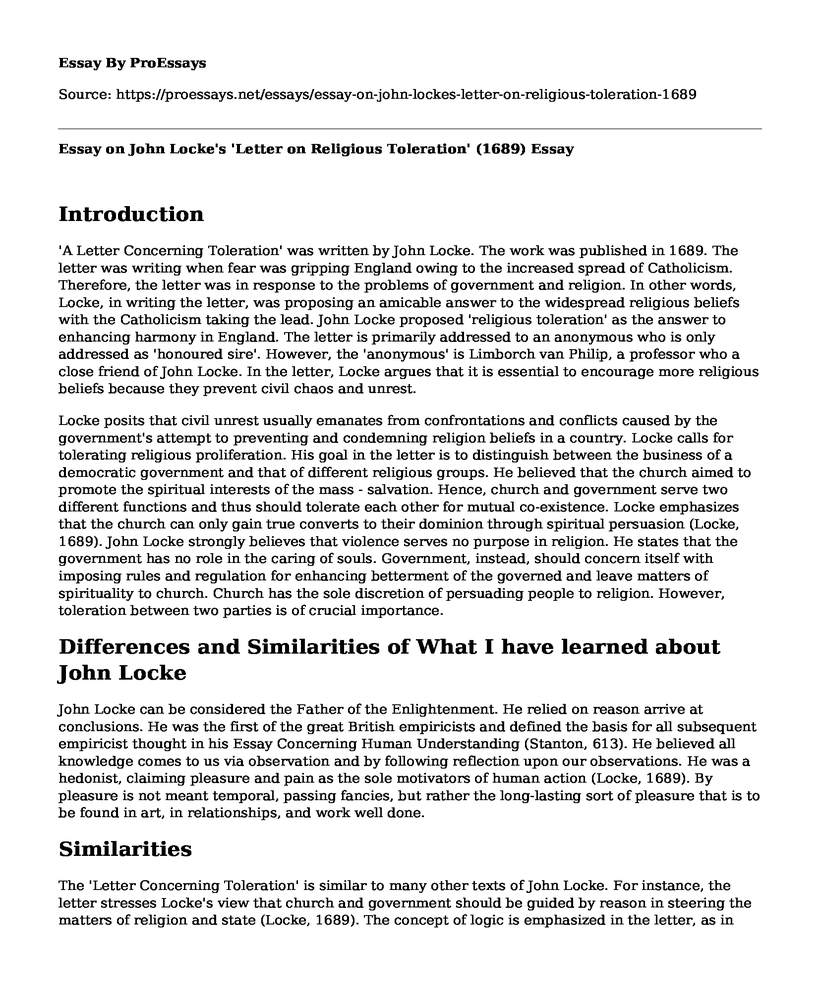Introduction
'A Letter Concerning Toleration' was written by John Locke. The work was published in 1689. The letter was writing when fear was gripping England owing to the increased spread of Catholicism. Therefore, the letter was in response to the problems of government and religion. In other words, Locke, in writing the letter, was proposing an amicable answer to the widespread religious beliefs with the Catholicism taking the lead. John Locke proposed 'religious toleration' as the answer to enhancing harmony in England. The letter is primarily addressed to an anonymous who is only addressed as 'honoured sire'. However, the 'anonymous' is Limborch van Philip, a professor who a close friend of John Locke. In the letter, Locke argues that it is essential to encourage more religious beliefs because they prevent civil chaos and unrest.
Locke posits that civil unrest usually emanates from confrontations and conflicts caused by the government's attempt to preventing and condemning religion beliefs in a country. Locke calls for tolerating religious proliferation. His goal in the letter is to distinguish between the business of a democratic government and that of different religious groups. He believed that the church aimed to promote the spiritual interests of the mass - salvation. Hence, church and government serve two different functions and thus should tolerate each other for mutual co-existence. Locke emphasizes that the church can only gain true converts to their dominion through spiritual persuasion (Locke, 1689). John Locke strongly believes that violence serves no purpose in religion. He states that the government has no role in the caring of souls. Government, instead, should concern itself with imposing rules and regulation for enhancing betterment of the governed and leave matters of spirituality to church. Church has the sole discretion of persuading people to religion. However, toleration between two parties is of crucial importance.
Differences and Similarities of What I have learned about John Locke
John Locke can be considered the Father of the Enlightenment. He relied on reason arrive at conclusions. He was the first of the great British empiricists and defined the basis for all subsequent empiricist thought in his Essay Concerning Human Understanding (Stanton, 613). He believed all knowledge comes to us via observation and by following reflection upon our observations. He was a hedonist, claiming pleasure and pain as the sole motivators of human action (Locke, 1689). By pleasure is not meant temporal, passing fancies, but rather the long-lasting sort of pleasure that is to be found in art, in relationships, and work well done.
Similarities
The 'Letter Concerning Toleration' is similar to many other texts of John Locke. For instance, the letter stresses Locke's view that church and government should be guided by reason in steering the matters of religion and state (Locke, 1689). The concept of logic is emphasized in the letter, as in many other texts of the author.
John Locke's viewpoint explores the significance of morality and how tolerance is essential for the betterment of society. He emphasizes the importance of equal rights and upholding moral values - fundamental concepts in the realm of psychology. He espouses the natural rights of a person - the right to liberty, life and property. He recognizes the importance of enhancing mutual harmony between religion and church(Locke, 1689). For instance, he emphasizes that every government has a role in securing the rights of its citizens. The government should recognize the role the church plays in society and thus, encourage it. The government should seek the consent of people it governs.
Reference
John Locke. (1689). A Letter Concerning Toleration. Retrieved from: https://www.constitution.org/jl/tolerati.htm
Cite this page
Essay on John Locke's 'Letter on Religious Toleration' (1689). (2023, Apr 24). Retrieved from https://proessays.net/essays/essay-on-john-lockes-letter-on-religious-toleration-1689
If you are the original author of this essay and no longer wish to have it published on the ProEssays website, please click below to request its removal:
- Summary of Administrative Ethics
- The Practice of Poetry as a Therapy Technique Essay
- Comparison of Two Poems: An Athlete Dying Young and Ex-Basketball Player
- How Religion Contributes to the Formation of Monsters in Beowulf - Essay Sample
- Essay Example on Being a Christian: Exploring the Definition of Faith
- Essay on The Odyssey: Surmounting External and Internal Enemies
- Paper Example on A Gloomy Masterpiece: Exploring Nathaniel Hawthorne's Writing







